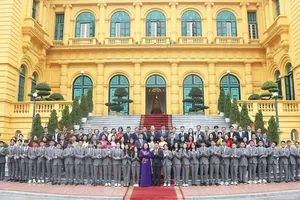
Ho Chi Minh City is proposing a significant increase in financial support for the children of workers, aiming to address the disparities that arose from the recent administrative merger of Ho Chi Minh City, Binh Duong, and Ba Ria-Vung Tau. The current system, which has different support levels and restrictive eligibility requirements, is insufficient given the city’s large population of industrial workers.
The new policy will cover over 92,000 children and 6,000 non-public preschool teachers across the city.
Key proposed changes:
- Increased Support for Children: The monthly tuition subsidy for children of workers will increase from VND160,000 to VND240,000. This higher amount aims to better reflect the true cost of raising a child and will be provided for up to nine months of the school year.
- Enhanced Teacher Allowances: Non-public preschool teachers will receive an allowance of VND1 million per month, a significant increase from the previous VND800,000. This is intended to recognize their professional qualifications and the daily pressures they face.
- Broader Scope: The policy will expand beyond just industrial park areas to include any commune, ward, or town with at least 3,000 registered workers. This change will ensure more children of workers can access the benefits.
- Facility Support: Independent and non-public preschools will receive one-time grants to improve facilities, equipment, and toys. The support levels are VND35 million (for facilities with fewer than 30 children), VND55 million (fewer than 50 children), and VND70 million (50-70 children). This will help these schools meet safety standards and reduce the burden on public preschools.
This comprehensive policy aims to ease the financial burden on working families, encourage school enrollment, and guarantee equitable access to quality education for all children. It marks a crucial step in ensuring the rights and well-being of the city's large workforce are protected.
Tuition support for over 8,000 ethnic minority students
The Ho Chi Minh City People's Committee has also put forward a new policy to provide financial assistance for ethnic minority students, graduate students, and researchers residing in the area. This initiative aims to address the economic challenges faced by many minority students following the administrative merger of Ho Chi Minh City, Binh Duong, and Ba Ria-Vung Tau.
The city is home to more than 509,000 people from 53 ethnic groups, with over 8,000 students currently enrolled in secondary school through university. An additional 200 individuals are pursuing postgraduate and doctoral studies. A significant number of these students, particularly those from the Cham, Khmer, and Choro ethnic groups, face economic hardships that are exacerbated by rising educational costs.
Thus, with the current basic salary of VND2,340,000, each student, postgraduate and doctoral student will be supported with about VND1,404,000 a month. In case the basic salary increases by more than 40 percent compared to the current level, the HCMC People's Committee will conduct an impact assessment and submit to the HCMC People's Council for consideration to adjust the support level to suit the actual situation.
This support policy is applicable to students belonging to the Cham, Choro, and Khmer ethnic groups who are permanent residents of Ho Chi Minh City and are currently enrolled in universities, colleges, or intermediate-level educational institutions across the country. Additionally, students from other ethnic minority groups may be considered for support if they have recently transitioned out of near-poverty status within the past 36 months and possess permanent residency in the city.
At the postgraduate level, the policy extends to graduate and postgraduate students of Cham and Khmer ethnicity who reside in Ho Chi Minh City and are pursuing studies at institutes, academies, or universities nationwide that offer postgraduate programs. For students of other ethnic minority groups, eligibility for support is contingent upon their classification as members of poor or near-poor households, as defined by the city's official standards.
However, this policy does not apply to students who are studying under the selection program, university preparatory school, work-study program, second university degree, or have received tuition support policies according to current decisions and decrees of the Government.
























